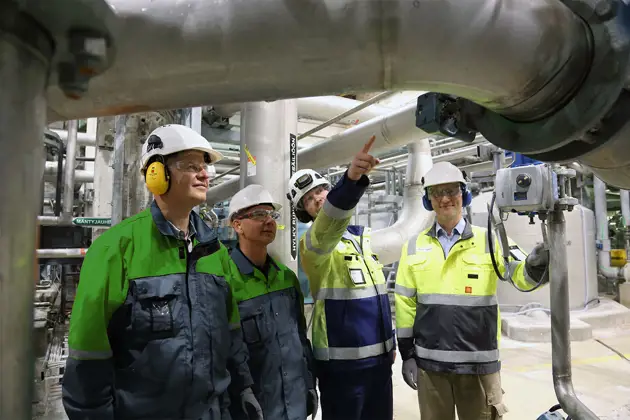Making more out of less – Supporting sustainability in bioindustry operations
In an already competitive market under legislative pressure to continuously improve environmental performance, sustainability and profitability have to go hand-in-hand. Our valve solutions are designed to help our pulp, paper and bioindustry customers achieve both key objectives.

The modern wood-based bioindustry is inherently about sustainability. Not only are the traditional pulp, paper, board and tissue products coming out of modern mills fully recyclable, many of the new bioproducts being developed and rapidly commercialized further improve the sustainability of the industry as a whole; Greener energy, new fossil-free fuels and a host of new products that are helping replace single-use plastics and other harmful materials. But just as the end products themselves, the processes behind them are also under constant scrutiny in terms of environmental impact.
Making the most of your raw materials
All modern mills are carefully monitoring the wood sourcing process and the sustainability of the forestry practices involved. At the same time the efficient use of these valuable raw materials is playing a crucial role in improving both profitability and environmental performance. Part of the equation is optimizing the performance of process valves to minimize oscillation and variance in the process, reducing waste resulting from fluctuations in the quality of the output. The performance and capabilities of accurate valve controllers such as our Neles™ NDX can go a long way in terms of helping reduce oscillation. The second important factor in raw material efficiency is the utilization of process sidestreams and waste, converting them into commercially viable bioproducts such as biofuel or energy.
Minimizing fugitive emissions
As these new bioproducts become a part of the mill ecosystem, new processes are being introduced. This means a new set of requirements for the valves in these processes. With chemical and gaseous flow media in the pipelines, minimizing fugitive emissions has become an increasingly valid concern. When talking about the reduction of fugitive emissions, we can see that it is not just an environmental act. Even though environmental performance is a high priority, minimizing losses due to emissions and leakages is a matter of money. The lost flow medium means both lost raw materials and smaller end-product yields. The loss of flow medium is also lost energy, as the pumps or compressors must do extra work to compensate for the leakage. A considerable amount of money can be saved by minimizing fugitive emissions. We put our valves through comprehensive testing and ensure that your valves have the required emissions certification for their intended use.
Achieving more with less energy
Studies suggest that energy costs can represent all the way up to 30% of a mill’s total production costs (European Commission, SETIS, Energy Efficiency in Pulp and Paper). Any way our valves can help reduce energy consumption will reflect on your bottom line. In addition to limiting losses due to fugitive emissions, the right valve as a part of your process can directly help reduce consumption. As much as this is about the quality of the valve itself, this is where our process understanding comes into play. For example, utilizing our unique digital Nelprof™ sizing tool for the selection and sizing of the right valve assembly can help achieve optimal flow characteristics without added pumping power. Reducing energy consumption in any industrial process is a great service to the environment, but when you can also help customers optimize the process of creating their own greener bioenergy from process waste to power their mill operations, the improvements to environmental performance are many-fold.
Stability is sustainability
Achieving process stability is perhaps the most important factor that valves can help with. Stability improves quality of production and reduces waste and loss of production. At the same time, it gives the process and the devices in it, longevity and reduces the cost and environmental impact of labor, travel and material expenditure related to maintenance and services. Stability also has a more local environmental impact, making the mill a safer place to work. The designs behind all of our valve products as well as the digital tools and expert services that accompany our valve solutions are based on the needs of our customers as well as our commitment to improving the efficiency and environmental performance of pulp, paper and bioproduct mills the world over.
Text by Jukka Borgman. For additional information, please contact tommi.bergstrom@valmet.com
The text has been updated in April 2022, due to the company name change to Valmet.

Subscribe to our newsletter
Subscribe now to flow control newsletter and receive the latest insights directly to your email.
Subscribe